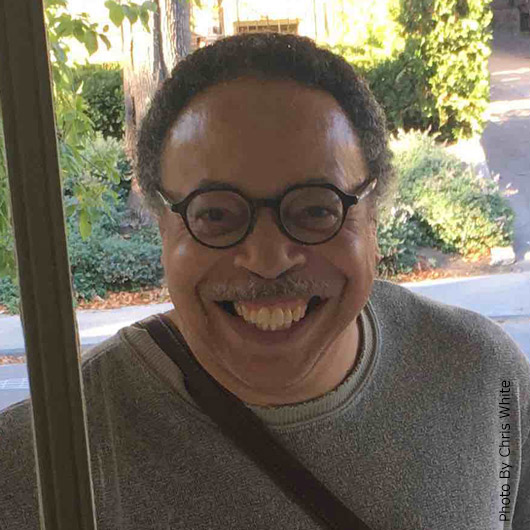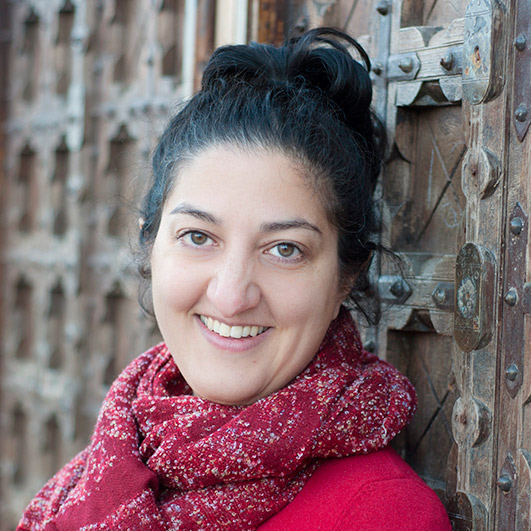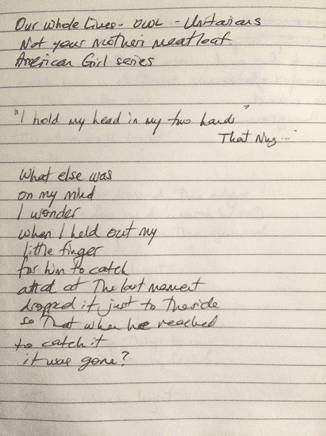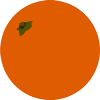Inter-
George Elliot Clarke

On Practice:
Do you write at the same time every day, in the same place? How would you describe your writing practice/s?
Depends on what I’m writing. For instance, working on my epic poem, “Canticles,” I only write it when I’m travelling outside of Toronto. So, that means the poems are being penned in airports, hotel rooms, cafes/restaurants, and on trains and in planes and on boats. As for “practices,” I tend to review lists of images, lines, phrases, ideas, that I jot down randomly, several times a week. Then, when I’m ready to write a poem, I scan the list(s), and I begin to see how various pieces suddenly combine—in an inspired, surrealistic fashion—to produce a poetic utterance.
What do you do if you get stuck while writing a poem?
Take a drink. Or two.
Take a photograph of a page from your notebook or a screenshot of an electronic file of a poem you have been recently writing or revising.
I’m too technologically inhibited to have access to an electronic camera, and I don’t know how to do a screen-shot. So, here is a cut and paste of a poem in progress:
Claire Clairemont’s Penitential Blues
On the Spanish Steps,
I hefted my skirts,
And down he went on his knees.
On the Spanish steps,
I hoisted my skirts,
And down dropped he to his knees.
My sassy French tongue
Teased his to sweet hurts,
For Keats said “No,” but Byron begged, “Please!”
Nasty French kisses,
Then Turkish delights,
Brought the French tickler into play.
Tasty French kisses,
Like Turkish delights,
Brought the French tickler out to play.
His attempt at Greek—
Cunning linguist bites—
Had me stewing Sex with Sodomy.
Those days are long gone;
I learned my lessons;
And Keats is dead, Shelley too.
On the Spanish Steps,
I was no virgin;
Now Keats is dead, Shelley too.
I stuck Byron’s heart
In the tickler tin,
For our only offspring’s pickled in dew.
[Boston (Massachusetts) 26 novembre mmxvi]
On Poetry:
Is there something you once believed about poetry that you no longer hold true? What changed?
That the poem must be in print and must be published to be valued as a poem or poetry. What changed was the experience of reciting poetry aloud, with music, in Italy, and hearing folks shout, “Maestro! Maestro!,” as a saxophonist and I made one of my blue poems holler! Indeed, in May 2016, I opened up the Vicenza Jazz Festival and starred in the Vicenza Poetry Festival, and I had jazz musicians accompanying me on both gigs. Now, I’ve just recorded a CD, my first, in a year where I’ve also published two collections of poetry….
What can/does poetry change?
Minds and hearts: And changing either one changes everything.
Is there something you now think you know about poetry that you wish you’d known a decade ago?
That poetry is organic—pulse, breath, heartbeat, and the poet can’t live who won’t mirror/echo the life in words of rhythm.
On Influence & Inspiration:
What books are on your night stand, the back of the toilet, your desk?
In my small house, one room serves as my personal library. In that room, there are shelves dedicated to Bob Dylan (books by and about), Miles Davis (books about), Ezra Pound (books by and about), Derek Walcott (books by), and Malcolm X (books by and about). At my University of Toronto office, I keep shelves dedicated to George Grant (books by and about) and Pierre Elliott Trudeau (books by and about).
Which writer/s do you (re)read the most? What does the writing do for you upon return?
Pound, Walcott. Stimulate even more frustrating ardour to be almost as good.
Among the poets you most admire, who has influenced you the least? Why have you not been influenced by his/her/their work?
Shakespeare. Kind of musty.
Describe a moment from your life when you've been overcome by how beautiful something is.
Witnessing my daughter’s birth.
On Teaching:
How would you describe poetry to a four-year-old? To the non-literary family ancestor you imagine as a great source of who you are?
Taking crayons, jumbling em, and breakin em into pieces, then using these crayons after the colours have all mixed up with each other. OR—for my Great Aunt Portia May White, a famed contralto (1911-68): Making stained glass out of fingerpainted images.
What characteristics does your ideal poem possess?
Clear, startling, vivid image; sound/wordplay; heartfelt utterance; memorable (proverbial) lines.
Do you teach poetry? If so, what are you trying to teach through poetry? What has poetry taught you?
Yes. Freedom of imagination. To insist on freedom of being, of breath and thought. That’s Justice.
On Publishing & Themes Present/Future:
How has publishing your poems changed your writing practice, process, and product?
Puts me in touch with an audience; i.e., I begin to suspect/expect that I’m not writing into a black hole, that I’m not singing into a vacuum. I begin to want to write to please others, but not by sacrificing one jot of my interests and/or style and/or poetics.
Is there a poem you've always wanted to write but haven't? If so, why are you waiting?
I put off attempting my epic poem—Canticles (which is a trilogy—or tetralogy)—until I was 48, for I wanted to feel mature enough to speak with (relative) authority about life, and I plan to complete it by age 61. The first two parts of Book 1—Canticles I (MMXVI) and Canticles II (MMXVII)—are now done and are out from Guernica Editions, and I’ve now furthering Book 2, or Canticles II, which is especially daunting, for it is a revisiting of biblical and other sacred texts. I hope to see Book 2 published by 2019 and Book 3 (Canticles III), dealing with the Nova Scotia Black Baptist Church, out in 2021.
What subjects, themes, forms, aesthetics, etc. do/will you explore in your work?
Imperialism and anti-imperialism; slavery and antislavery. The methodology? Duelling monologues, sometimes with translations, as an obvious riposte to Pound.
On Oranges:
Oranges or apples? Why?
Apples: Easier to eat. Just bite right in.
About the Poet
George Elliott Clarke, the 4th Poet Laureate of Toronto (2012-15) and 7th Parliamentary Poet Laureate (2016-17) is a noted artist in song, drama, fiction, screeplay, essays, and poetry. He invented the term Africadian and pioneered the study of African-Canadian literature and now teaches African-Canadian literature at the University of Toronto. Clarke holds appointments to the Order of Nova Scotia and the Order of Canada. His recognitions include the Governor-General’s Award for Poetry, the Dartmouth Book Award for Fiction, the Eric Hoffer Book Award for Poetry (US), and the Dr. Martin Luther King Jr. Achievement Award.
Inter-
Surya Govender

On Practice:
Do you write at the same time every day, in the same place? How would you describe your writing practice/s?
Not even remotely. I would describe my writing practice as random and haphazard. I write when I get an inspiration, which can happen anywhere—when I’m reading someone else’s work, listening to the radio, taking a class, falling asleep, etc. I also write when I make myself do it. Which is most often either at my desk, in front of my computer, or at my kitchen table, with my notebook.
What do you do if you get stuck while writing a poem?
Research. I usually don’t push a poem very hard. I haven’t found that works out well. So, instead, I go ferreting about on the internet until some little factoid catches my imagination that I can either bring back to the poem, or start a new one with.
Take a photograph of a page from your notebook or a screenshot of an electronic file of a poem you have been recently writing or revising.

On Poetry:
Is there something you once believed about poetry that you no longer hold true? What changed?
I think I once believed that I could create a body of work from inspiration alone. It’s not that I didn’t want to work at it, I just never find the stuff I work at is as good as the stuff that comes almost fully formed. Which is what it is. But whatever it is, it does not add up to a book! So, with age and wisdom (mostly age), I’ve realized that the work part just has to happen, and I have to get better at approximating the inspirational moments in different ways (i.e. sweat).
What can/does poetry change?
Minds. Hearts. Diapers. Actually, probably just hearts. And hearts can change minds. And minds, well, minds can’t change diapers either. Darn.
I do, truly, believe that poetry’s power is in the way it nestles into us and changes the way we feel in the world. Emotion has the power to incite action, and that is where poetry is at its best.
Is there something you now think you know about poetry that you wish you’d known a decade ago?
Not really. I’ve always known it’s hard to do, easily misunderstood, and highly underrated. No change there.
On Influence & Inspiration:
What books are on your night stand, the back of the toilet, your desk?
Textiles: the whole story by Beverly Gordon; Stalin’s Daughter by Rosemary Sullivan; Americana by Chimamanda Ngozi Adichiel; The Wrong Cat by Lorna Crozier; The Lacuna by Barbara Kingsolver; Tuco by Brian Brett, etc. etc….
I went through a long period when my kids were born (they’re now seven and four) when I read almost nothing. It was very strange. Then I read a lot of magazines. I’ve only recently come back to reading books. The non-fiction tends to sit by my bed the longest, but eventually I get through it. The poetry I come to sporadically. And the novels I tend to read quickest and most often. Now that I have to squeeze reading time into family time, I find myself weighing news against pleasure against research…so I try to combine them all as often as possible.
Which writer/s do you (re)read the most? What does the writing do for you upon return?
Michael Ondaatje. Mary Oliver. Lorna Crozier. I think what I like about all of them is that they are in the world. My favourite poetic moments are simple insights into the everyday things we do and experience. I notice, as I get older, I’m less interested in “the best writers of our time” and more drawn to things that speak to my life. While I can appreciate the language of the classics, the vocabulary of a more academic style, or the rebellion of those who wordplay, none of these touch me in the same way as poetry about the smell of skin, a bear in the woods, or the awkward moves of old lovers.
Among the poets you most admire, who has influenced you the least? Why have you not been influenced by his/her work?
Probably Leonard Cohen. I’m a huge fan, but to be honest, anyone else doing what he does would just sound stupid.
Describe a moment from your life when you've been overcome by how beautiful something is.
Oh goodness. Isn’t that a poet’s job? To be constantly overwhelmed by beauty?
Since it is Autumn, let me say rotting fall leaves. The colours! The skeletons emerging! The impressions left on sidewalks! Or since I am a mother, let me say the moment after my children have fallen asleep, when I am freed to savour their warm skin and the memory of whining is temporarily distant and unreal. Or, since I am an artist, let me say the colour of mushrooms.
It’s constant, the overwhelm.
On Teaching:
How would you describe poetry to a four-year-old? To the non-literary family ancestor you imagine as a great source of who you are?
This question makes me wonder if I have ever tried to describe poetry to my four-year-old. I guess the time is now.
To my daughter: Poetry is beautiful words put together to make you feel something and tell a story. It’s different from a story-story, because usually, with poetry, you use fewer words and you care more about which ones you use. Sometimes it rhymes. And it always feels a bit like singing. Want to try it?
To my grandmother: Poetry is how I tell our story.
What characteristics does your ideal poem possess?
My ideal poem tells a story that no one else has told in quite the same way. It’s political in a way that sneaks up on you. It is clear about what is of value and it creates meaning for the reader, but it doesn’t have an agenda. It comes from thought and feeling, in equal measure, and it generates the same out in the world. It has rhythm and flow, so that you find you can read it without having to practice. It looks good on the page, using space and line with confidence. It is not brash in content or in style, but neither does it apologize for itself. It has a quiet power that invites you to sit with it, have a drink, and begin again.
Do you teach poetry? If so, what are you trying to teach through poetry? What has poetry taught you?
I do teach poetry. I think I am trying to unlearn people from what they think about poetry. I am always reminding folks that poetry doesn’t have to rhyme, although it can, and it doesn’t have to be confusing, although it can also be that too. I would love for my students to believe in the power of poetry and their own poetic voice.
Poetry has taught me that we don’t choose our strengths. If I got to choose, I’d be a soul singer wearing sequins every day. But let’s just say, I’m not. I have tried to choose other things to be good at, but it turns out that this is my thing. Which doesn’t mean it comes easily or that I am particularly excellent at it, just that it’s what chose me. It’s a lesson I try to remember as often as possible.
On Publishing & Themes Present/Future:
How has publishing your poems changed your writing practice, process, and product?
Hmmm. Publishing, as infrequently as I do, bolsters my confidence, and helps me to return focus to the work. So, I guess it makes me write more. But I don’t know that it has changed the writing itself.
Having said that, I am working on a series right now that, in part, considers the sometimes very technical aspects of textile creation. Because I want to publish it, the project is making me think carefully about how an audience will understand these poems and how I can make them more accessible. It’s not something I’ve considered before and it definitely adds an interesting element to the creative process.
Is there a poem you've always wanted to write but haven’t? If so, why are you waiting? What subjects, themes, forms, aesthetics, etc. do/will you explore in your work?
Ah, I hope there are poems I haven’t written yet! If I haven’t, then I suppose it’s because I haven’t yet found the words. I am currently working on a series about textiles, women’s work, and the crafts associated with these things. It’s a subject that draws me ever deeper and satiates my artist desire to create at the same time. It is fascinating to learn, make and write all at the same time. These things feed each other in interesting ways and I am enjoying it all, very much.
On Oranges:
Oranges or apples? Why?
Apples. Because oranges grow in Florida and apples grow in my yard. Also, apples do better in pies and jars and they don’t make my keyboard sticky.
About the Poet
Surya Govender writes, teaches, and lives a happy life in Vancouver, BC. From a long line of writers on both sides of her family, she comes by the habit honestly. Her poetry tends towards the narrative, drawing focus to the remarkable stories that make up our everyday lives. She has published work in Canada, the US, and the UK. In her day job(s), she teaches community development at Capilano University, facilitates workshops on storytelling with digital media, teaches writing workshops in the Downtown Eastside, and parents two small children. She is currently working on a series about textiles.
